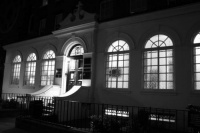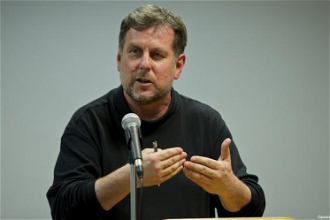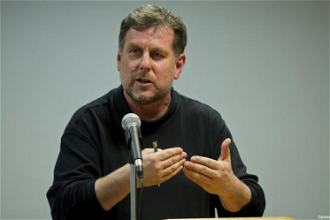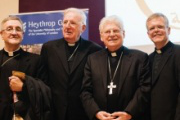Dr Michael Kirwan SJ reflects on Heythrop College

Heythrop College - image Mary Carson
The decision announced by Heythrop College that it will close 'in its present form' as a college of the University of London has been greeted with widespread dismay, astonishment and frustration. We face the potential loss of a unique and valuable educational resource, both for the Catholic community, and for the academy and the wider society in the United Kingdom.
Most of the commentary has centered on the financial roots of Heythrop's crisis. Put simply, it has become too expensive to run a Higher Education institution in the way that Heythrop has been run for the last 45 years. The college is a victim of recent changes in tertiary education, which have left small institutions extremely vulnerable.
Since Heythrop's incorporation into the University of London in 1970, it has been fabulously resourced by the Jesuits: by direct grant, by subsidizing Jesuit academic staff, by maintenance of its magnificent library, and- more recently- by the provision of a fine strategic Kensington site at a peppercorn rent. And yet the level of continued support needed would be two or three times what the Jesuit province feels it can afford at this time.
Distressing as this is, it is important to recognize this sad decision in the light of a the Jesuits' proud and generous history of commitment over nearly five decades.
Nevertheless, money is only ever one side of the story, and it would be good keep three other considerations in mind if we are to understand what is really at stake.
Firstly, in Heythrop's case there are other scarcities and not just financial. Heythrop is part of a worldwide network of Jesuit institutions, all facing up to a shrinkage of Jesuit academic staff and of Jesuit students. Without Jesuits, the integrity and identity of these works as Jesuit are very hard to maintain. As yet there is no effective structure at a regional (European) or global level for the Society of Jesus to allocate its manpower and other resources cooperatively, rather than these resources being simply competed for- another 'internal market'. We might see this as a lack of 'subsidiarity'.
A decision is made, legitimately, to close a 'local' work of the Jesuits: but this work has grown to be of considerable importance in the UK and beyond, so that closure has big repercussions at an international level which could not have been foreseen in 1970.
Hence the dismay and frustration: there is now a real possibility that the largest city in Europe, and one its most important cultural and political capitals, will be left without a serious Jesuit intellectual presence.
The second point is to highlight a particular tension around theology: what it is, and why it is important. Heythrop has flagged itself up as the 'specialist college in theology and philosophy' of the University of London. This means that it focuses upon a special kind of interdisciplinary conversation, between two ancient forms of enquiry which were classically at the heart of what a 'university' was understood to be: the ordered and loving ('philo-') search for meaning and wisdom, and this quest understood specifically as a response to and orientation towards religious transcendence. Theology is 'faith seeking understanding'. The academic vision of Heythrop is built around the integrity of this dialogue. It does not exclude other conversations with the humanities, social science, religious studies etc., nor does it condemn other ways of doing theology. But it is a distinctive approach which has been conducted in different ways throughout the 400 year history of the college, and which was celebrated marvelously in our anniversary celebrations in 2014.
For the last 45 years the Jesuits have found an excellent place to have this conversation: as a member college of an established, world-renowned university, which is largely secular in its origins and indeed in its identity, but happy to include an autonomous, religiously-inspired college within its federation. It is hard to think of a better strategic setting from which Catholic theology and philosophy could reach out and engage with the secular academy- and hard to think how such a setting might be replaced when Heythrop closes.
There is a third point, related to the question of how theology and how it is done, namely who does it? Since 1970 Heythrop has formed lay men and women in its specialist disciplines. It has also continued its traditional work of training Jesuit students and others for priestly ministry in the Catholic church, in the belief that these two groups of students can fruitfully learn together.
It is now clear that there is a tension between these two tasks, and in the light of Heythrop's difficulties it is a question whether they can be done together after all. Priestly formation is centred on the needs of the local church, and it requires consistency and solidity of theological provision. It needs to be done well. But it is not, primarily what the Jesuits have been asked to do in their intellectual apostolate and ministry.
The General of the Jesuits, Fr Adolfo Nicolas, has called for Jesuit universities and colleges to be a ministry of depth, creativity and international networking.
Research and scholarship, whether in theology and philosophy or in other disciplines, have an international dimension, and require a different level of creative focus and engagement. In a postmodern academic culture which values only what is effervescent and superficial, and regards sustained intellectual commitment as a weakness, the Church needs this intellectual depth, and has a right to it- but so does the academy, and so does the wider society.
Modern Jesuit theology, at Heythrop and elsewhere, has been animated by the implicit belief that the opportunity to reflect seriously about human meaning and about God is a basic human right. Everyone, not just seminarians, and not just committed Christian believers, needs to be invited into the conversation about God. Certainly this is what Pope Francis is asking of Catholics, to take a more confident and active responsibility in the Church and world.
The need for creative theology in the church, academy and society has never been greater. The financial difficulties of Heythrop and its uncertain future make for sad and frustrating reading, and there is no getting round the difficult economics. But it gives us an opportunity to think once again about what 'faith seeking understanding' means, not just for those who will serve us as priestly ministers, but for the whole people of God.
Dr Michael Kirwan SJ is Head of Theology at Heythrop College


















